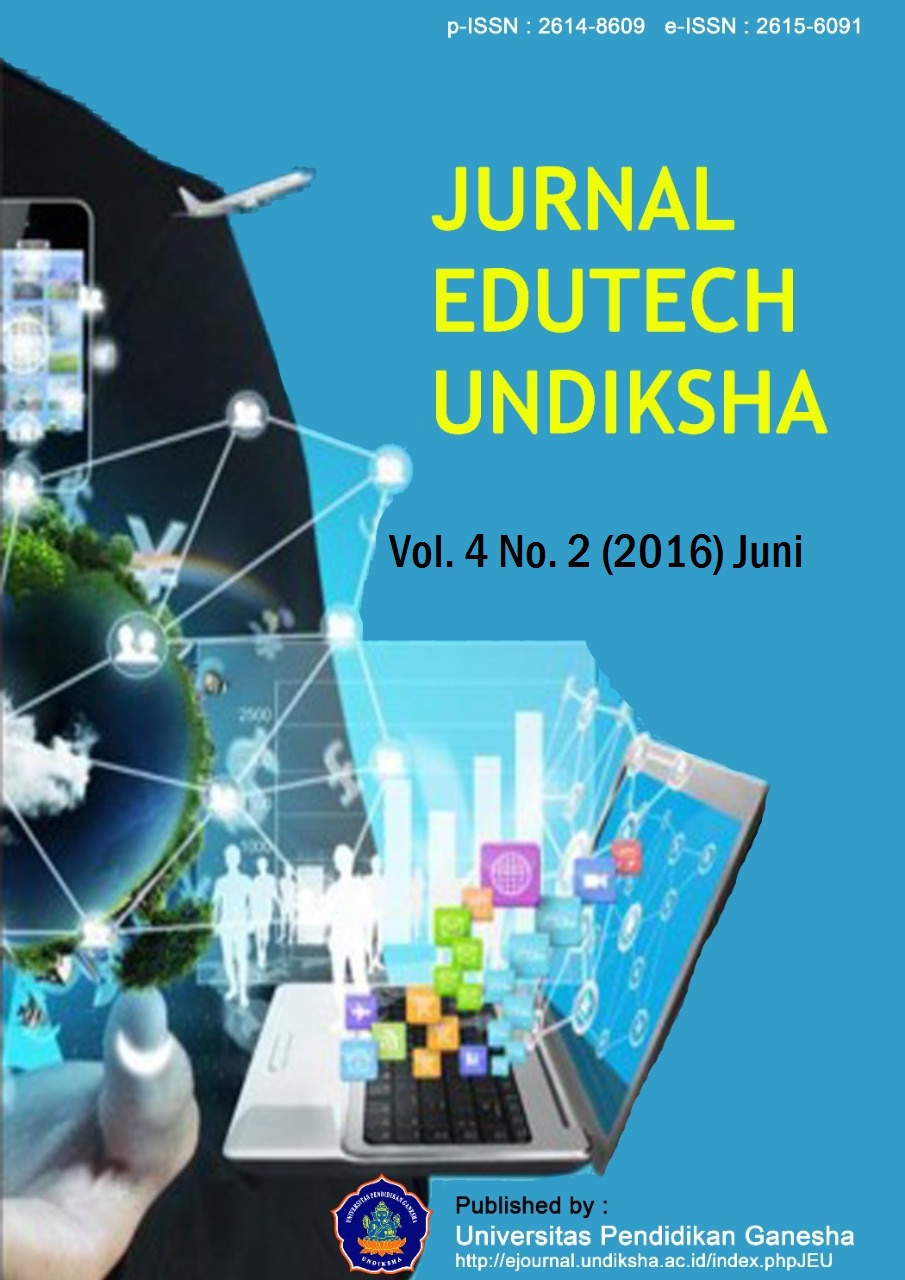PENGEMBANGAN E-LEARNING DENGAN MODEL PROTOTYPE BERORIENTASI MODEL PEMBELAJARAN INQUIRY SISWA KELAS VII SMPN 2 NEGARA
DOI:
https://doi.org/10.23887/jeu.v4i2.7615Abstract
Permasalahan dalam penelitian ini adalah rendahnya hasil belajar siswa, minimnya sumber belajar, dan kurangnya jam pelajaran di kelas. Penelitian ini bertujuan untuk (1) mendeskripsikan rancang bangun pengembangan e-learning, (2) mengetahui kualitas e-learning, (3) mengetahui efektivitas e-learning. Data dalam penelitian ini dikumpulkan dengan menggunakan metode observasi, wawancara, kuesioner, dan tes tertulis. Mengacu pada metode tersebut, maka instrumen yang digunakan dalam mengumpulkan data yaitu lembar observasi, pedoman wawancara, angket, dan tes. Data yang terkumpul dianalisis dengan teknik analisis deskriptif kualitatif, teknik analisis deskriptif kuantitatif, dan teknik analisis statistik inferensial (uji-t). Hasil penelitian menunjukkan bahwa (1) rancang bangun pengembagan e-learning mengacu pada model prototype yaitu mulai dari menentukan software, menentukan materi, merancang flowchart, storyboard, dan program mapping hingga menjadi e-learning berbasis moodle. (2) Hasil validitas produk diperoleh ahli isi mata pelajaran berada pada kategori sangat baik dengan persentase 92%, ahli desain pembelajaran pada kategori cukup dengan persentase 74%, ahli media e-learning pada kategori sangat baik dengan persentase 92%, uji coba perorangan pada kategori sangat baik dengan persentase 90%, uji coba kelompok kecil pada kategori sangat baik dengan persentase 90,67%, dan uji coba lapangan pada kategori sangat baik dengan persentase 91,13%. (3) Hasil uji efektivitas e-learning yaitu diperoleh thitung lebih besar dari pada ttabel dengan taraf signifikansi 5% dan db 74 yaitu 16,94 > 2,00. Hasil penelitian tersebut menunjukkan efektivitas pengembangan e-learning menunjukkan bahwa terdapat perbedaan yang signifikan terhadap hasil belajar siswa kelas VII J sebelum dan sesudah menggunakan e-learning. Berdasarkan pemaparan tersebut, dapat dikatakan bahwa e-learning secara efektif dapat meningkatkan hasil belajar siswa.Kata Kunci : pengembangan, e-learning, prototype, inquiry
The problems of this research are the lack of students learning outcomes, lack of learning sources, and the lack of lesson time in the class. This research aims to 1) Describe the design development of e-learning, 2) know the quality of e-learning, 3) know the effectiveness of e-learning. The data was collected by using observation method, interviews, questionnaires, and a written test. Referring to the method, the instrument used to collect data are the observation sheets, interview, questionnaire and tests. The data that were collected were analyzed by using descriptive analysis of qualitative, quantitative descriptive analysis techniques and inferential statistical analysis techniques (test-t). The results showed that 1) the design of the development of e-learning refers to the prototype model that determines the start of the software, determine the materials, designing flowcharts, storyboards, and mapping program become a moodle-based e-learning 2) Results showed that the product validity of the expert content of the subjects are in the very good category with a percentage of 92%, instructional design experts in the category enough with the percentage of 74%, media expert e-learning in the very good category with a percentage of 92%. individual testing is in the very good category with a percentage of 90%, small group testing in the very good category with a percentage of 90.67%, field testing in the very good category with a percentage of 91.13%. The result of the effectiveness of e-learning that is acquired tcount bigger than ttable with a significance level of 5% and 74 db is 16.94> 2.00. The results showed that the effectiveness of e-learning development shows there are significant differences on learning outcomes science students in grade VII J before and after using e-learning. Based on exposure above, it can be conclude that e-learning can effectively improve students learning outcomes students.
keyword : development, e-learning, prototype, inquiry
Published
2016-07-18
How to Cite
., I. P., ., I. K. S. M., & ., D. I. M. T. S. M. (2016). PENGEMBANGAN E-LEARNING DENGAN MODEL PROTOTYPE BERORIENTASI MODEL PEMBELAJARAN INQUIRY SISWA KELAS VII SMPN 2 NEGARA. Jurnal Edutech Undiksha, 4(2). https://doi.org/10.23887/jeu.v4i2.7615
Issue
Section
Articles
License
Authors who publish with the Jurnal Edutech Undiksha (JEU) agree to the following terms:
- Authors retain copyright and grant the journal the right of first publication with the work simultaneously licensed under an Attribution-ShareAlike 4.0 International (CC BY-SA 4.0) that allows others to share the work with an acknowledgment of the work's authorship and initial publication in this journal.
- Authors are able to enter into separate, additional contractual arrangements for the non-exclusive distribution of the journal's published version of the work (e.g., post it to an institutional repository or publish it in a book), with an acknowledgment of its initial publication in this journal.
- Authors are permitted and encouraged to post their work online (e.g., in institutional repositories or on their website) prior to and during the submission process, as it can lead to productive exchanges, as well as earlier and greater citation of published work. (See The Effect of Open Access)








